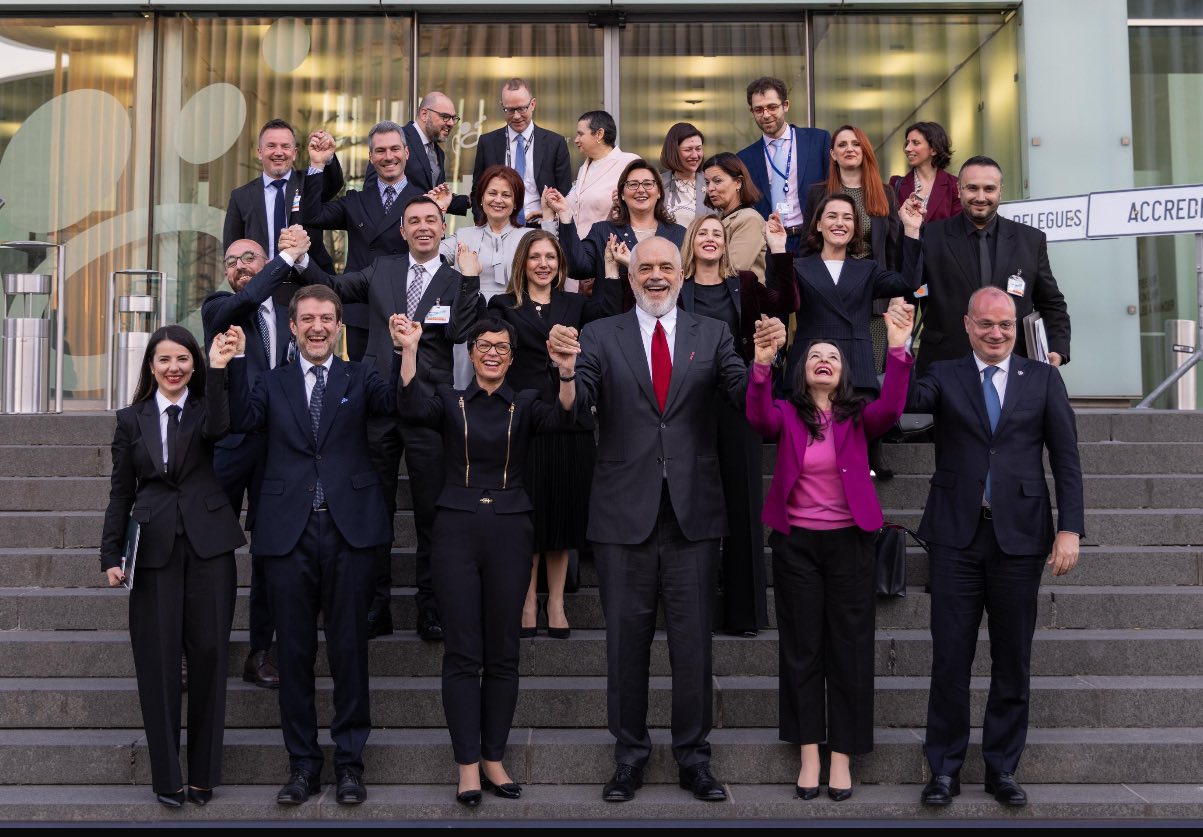Fourth intergovernmental conference gives boost to Albania’s EU ambitions amid election campaign

Albania opened its fourth Intergovernmental Conference with the European Union on Monday in Luxembourg, launching the second negotiation cluster — “Internal Market.” The opening coincides with the official start of Albania’s election campaign, where EU integration is the central message of Prime Minister Edi Rama’s Socialist Party.
Why is this important: The move is seen as a political and diplomatic win for the government, signaling EU recognition of Albania’s reform progress. It also delivers a boost to Rama’s campaign narrative of securing EU membership by 2030. But opposition voices continue to cast doubt on the process, citing political mismanagement and international hesitation.
Context: The second negotiation cluster, “Internal Market,” covers legislation on the free movement of goods, workers, and capital; the right of establishment and the freedom to provide services; company law; intellectual property; competition policy; financial services; and consumer and health protection. The chapter is seen as critical to building a safe and functioning environment for businesses.
At the joint press conference, EU Enlargement Commissioner Marta Kos called Albania “a success story” of the EU enlargement process and said a new step had been taken toward full membership.
“This is good news for the citizens of Albania, as future EU citizens,” said Kos. “It is the result of the Albanian authorities’ determination to implement reforms over many years.”
Kos said the plan is to open all clusters within this year and begin closing them in 2025. But she warned that further political commitment is essential, especially in areas such as judicial reform, independence of the judiciary, anti-corruption, property rights, minority rights, and freedom of expression.
“If Albania implements the necessary reforms, I will be your best advocate in Brussels and in all member states,” Kos said. “My message to Albanian citizens is clear: Albania’s future is undoubtedly in the EU.”
What else: Polish Foreign Minister Radosław Sikorski, whose country holds the EU Council presidency, also expressed strong support.
“The chapters we opened today are vital for Albania’s economic integration into the EU,” Sikorski said. “The necessary reforms will lead to economic convergence with the EU. We congratulate the Rama government for its efforts. Albania is a reliable NATO partner and a supporter of Ukraine. The EU is a secure and prosperous future — we’ve seen that in Poland since 2004.”
Prime Minister Rama thanked Commissioner Kos personally, crediting her for helping push forward Albania’s EU path.
“Thanks go to the European Commission and to Commissioner Kos, who once broke records in water and became a champion in her country — and now acts as a stopwatch for our countries, keeping time and ensuring that every step moves us forward with discipline,” Rama said.
“Together with the Commission, under the disciplined leadership of Commissioner Kos, we’ve agreed on an ambitious agenda. We are eager to make sure that all clusters are closed by 2027. It’s very ambitious, but we are here to show our strong will, determination, and passion to achieve this goal.”
“Membership is more than a political or economic ambition — it is an existential life choice.”
Rama also commented on the opposition’s earlier claims that negotiations were stalled due to Socialist mismanagement.
“We have learned the hard way that with the EU, you never ask for a date — you must always be ready for the next one,” Rama said. “We are here to show up on time for the meeting with the EU.”
Opposition reaction: Democratic Party leader Sali Berisha dismissed the conference as insignificant and pre-arranged.
“The intergovernmental conference was planned four months ago,” Berisha said, arguing that EU enlargement will remain stalled due to internal debates within the Union.
“The new German government will issue a statement that puts the integration process on standby,” he said. “There can be no further enlargement without EU reform. Germany and France are aligned on this. When those two come together, I assure you — that wall becomes impenetrable.”
Despite the EU’s public support, Berisha continues to insist that negotiations will be blocked due to Socialist governance.


